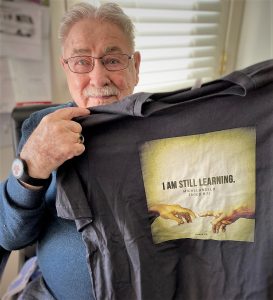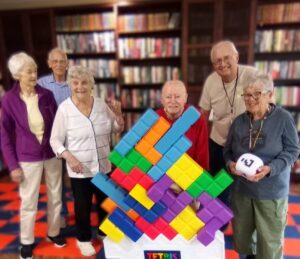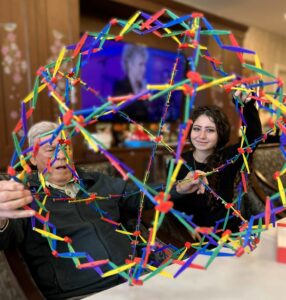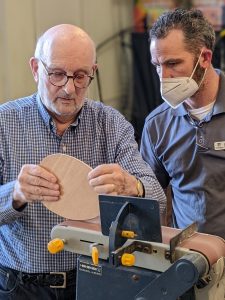
What are you most curious about? Is there a skill or hobby that you love? A new talent that you have always wanted to develop and explore, but have never found the time?
Generally defined as a strong desire to know or learn something, at its core curiosity is all about noticing and being drawn to things we find interesting. It’s about exploring the pleasures that novel experience offers us. Or deepening our knowledge about the familiar.
For residents at All Seniors Care Living Centres, being endlessly curious is the key to a happy and healthy retirement.
The Power of Curiosity and Lifelong Learning
 As we age, curiosity becomes an invaluable companion. While it’s easy to slip into routine or feel less inclined to try something new, nurturing our sense of wonder plays a surprisingly important role in healthy ageing.
As we age, curiosity becomes an invaluable companion. While it’s easy to slip into routine or feel less inclined to try something new, nurturing our sense of wonder plays a surprisingly important role in healthy ageing.
To boost brain power, people need regular engagement and involvement in tasks that challenge the way we think, such as learning a new skill. The Global Council on Brain Health (GCBH) calls these ‘cognitively stimulating activities’ or CSAs , a fancy term for fun challenges that keep our minds limber. So, how do these activities keep the mind healthy and active?
- They help your brain think outside the box. Doing so generates new neurons (the cells that send information to your entire body) and create new neural connections. This impacts memory, attention, thinking, language, and reasoning skills.
- Continually learning new things can reduce the risk of cognitive decline.
- Learning new things contributes to building our confidence and self-esteem, not to mention a sense of pride, accomplishment and purpose.
- Adults who engage in more CSAs every week report a higher sense of cognitive functioning, health, and overall well-being than those who don’t.
The greater the range and depth of our curiosity, the more opportunities we have to experience things that inspire and excite us, from minute details to momentous occasions. As Sophia Lauren said, “There is a fountain of youth: it is your mind, your talents, the creativity you bring to your life and the lives of people you love.”
How To Develop Your Curious Side
 Challenging yourself to learn skills, such as drawing or a new sport, helps improve the way our brains work. Even though scientists are still studying all the long-term effects, we know this: when we follow our curiosity and choose activities we actually enjoy, we’re more likely to stick with them. And sticking with them leads to longer-lasting improvements in cognitive functioning and quality of life. In fact, new research has shown that staying curious keeps our brains young.
Challenging yourself to learn skills, such as drawing or a new sport, helps improve the way our brains work. Even though scientists are still studying all the long-term effects, we know this: when we follow our curiosity and choose activities we actually enjoy, we’re more likely to stick with them. And sticking with them leads to longer-lasting improvements in cognitive functioning and quality of life. In fact, new research has shown that staying curious keeps our brains young.
Here are some tips on how you can cultivate curiosity:
1. Keep an open mindLog Out
This is essential to having a curious mind. Be open to learn, unlearn, and relearn. Being prepared to re-evaluate beliefs and opinions is key. You never know what you might discover about yourself and the world!
2. Ask questions, relentlessly
To quote the novelist José Saramago: “Old age starts where curiosity ends”. Remember when the world seemed big, bright, and new? Since a toddler’s life experience is minimal, their wonder and imagination is huge! From an evolutionary standpoint, questioning forms new patterns in the brain. So, get in touch with your inner child and ask “why” more often!
3. Change your perspective
Curious people are unlikely to call something boring. Instead, they see everything as a door to an exciting new world. The best way to change your perspective is to avoid taking things for granted. Try to dig beneath the surface of experiences and nothing will ever be boring again.
4. See learning as fun
Researchers from the University of California conducted a series of experiments to discover what exactly goes on in the brain when our curiosity is aroused. It turns out that curiosity curiosity helps us remember information we might not even find particularly interesting.. More importantly, this activates the brain’s reward system, making learning feel more fun…and, ultimately, makes it more successful. So, try to look at life through a lens of fun and enjoy the process of learning something new.
5.Develop your imagination
 Curiosity is the spark that ignites the imagination and vice-versa. It’s important to try and create opportunities to let your mind drift rather than filling it with something to passively consume. Open your mind to unexplored paths. Experiment and try to turn the daily routine into “excursions” where something new is learned each and every day.
Curiosity is the spark that ignites the imagination and vice-versa. It’s important to try and create opportunities to let your mind drift rather than filling it with something to passively consume. Open your mind to unexplored paths. Experiment and try to turn the daily routine into “excursions” where something new is learned each and every day.
6. Explore Your Environment
Whether you live in a bustling city, a rural retreat or somewhere in between, the world outside your home is teeming with points of interest that are just waiting to be explored. Maybe there’s a wonderful shop just minutes away, or a wooded path that smells like adventure. Perhaps try a different activity in your retirement community or speak to a stranger. You never know, an adventure might just be around the next corner.
7. Practice Empathy
Practice putting yourself in someone else’s shoes; try seeing the world from different perspectives. You may not agree with other perspectives but by shifting your focus to include other views you will get a much deeper, richer understanding of the world and of others.
Stay Endlessly Curious at All Seniors Care

At All Seniors Care, residents often come together to mingle, giggle, and indulged their desire to discover new things. Whether learning to shoot a puck, trying Laughter Yoga, attending wellness talks, or puzzling over riddles, there’s always something exciting to discover.
If you want to be a part of a community that encourages you to awaken your inner Sherlock, our senior living centres create many interesting ways for residents to keep learning. They offer things like educational and creative classes, lectures, current affairs discussion groups, book clubs, and cultural excursions, just to name a few.
Whatever your age, interests, or abilities, you can enjoy activities that make you laugh, lose track of time, or feel like a kid at heart. Indulge in your curiosity: find a residence near you and keep up with all the latest events by following us on social media.
Writer – Julianna McLeod
Julianna is a health and wellness expert at All Seniors Care. Her mission is to create content that empowers seniors to form sustainable solutions for lasting health and happiness. She is an experienced writer, editor, and Recreational Therapist living in Toronto.